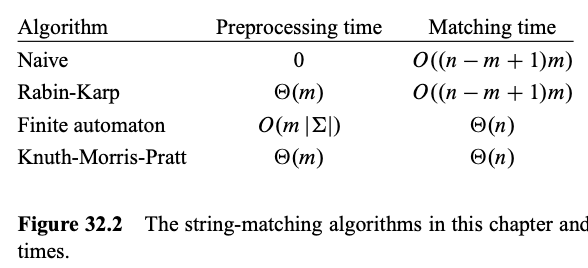1. String #
Created Tue May 14, 2024 at 9:38 PM
#string
API #
See 1-Containers
Solving use #
- Strings can be used when input is very large numbers
- Strings have a finite alphabet size, so practical bucketing is possible.
Practical use #
- Efficient algorithms for this problem—called “string matching”—can greatly aid the responsiveness of the text-editing programs.
- Search for particular patterns in DNA sequences.
- Internet search engines also use them to find Web pages relevant to queries.
Notable info #
String matching #
Text-editing programs frequently need to find all occurrences of a pattern in the text.

Naive algorithm #
- Working: Moves forward usually, but on first sign of trouble (mismatch), goes back by word size (-1).
- Con: goes back too much on mismatch. Kind of anti-KMP.
- O(m*n) time, O(1) space.
- O(n) time, O(1) space, for very short words and long text.
KMP (Knuth-Morris-Pratt) #
- Main idea: Keep stored knowledge of Word for reuse.
- Main trait: Never moves backwards in the Text.
- Working: Precomputes an array, which takes O(m) time), from the word string. Then effectively always moves forward in Text (checking against precomputed array). On collision, moves to most-right-side-possible and continues.
- Most powerful among string matching algos.
- O(m+n) time, O(m) space.
- O(n) time, O(1) space, for very short words and long text.
- Video: https://www.youtube.com/watch?v=V5-7GzOfADQ&ab_channel=AbdulBari
Rabin-Karp #
- Main idea: Two levels of checking - one weak, other normal (strong). i.e. Gets rids of false positives fast.
- Working: Decide a rolling hash, precompute hash of the Word (O(m) time). Then for each movement in Text, do O(1) hash compute and O(1) check. When hash matches, do an actual comparison matching.
- O(m*n) time, O(m) space.
- O(n) time, O(1) space, for very short words and long text.
- Video: https://www.youtube.com/watch?v=qQ8vS2btsxI&ab_channel=AbdulBari